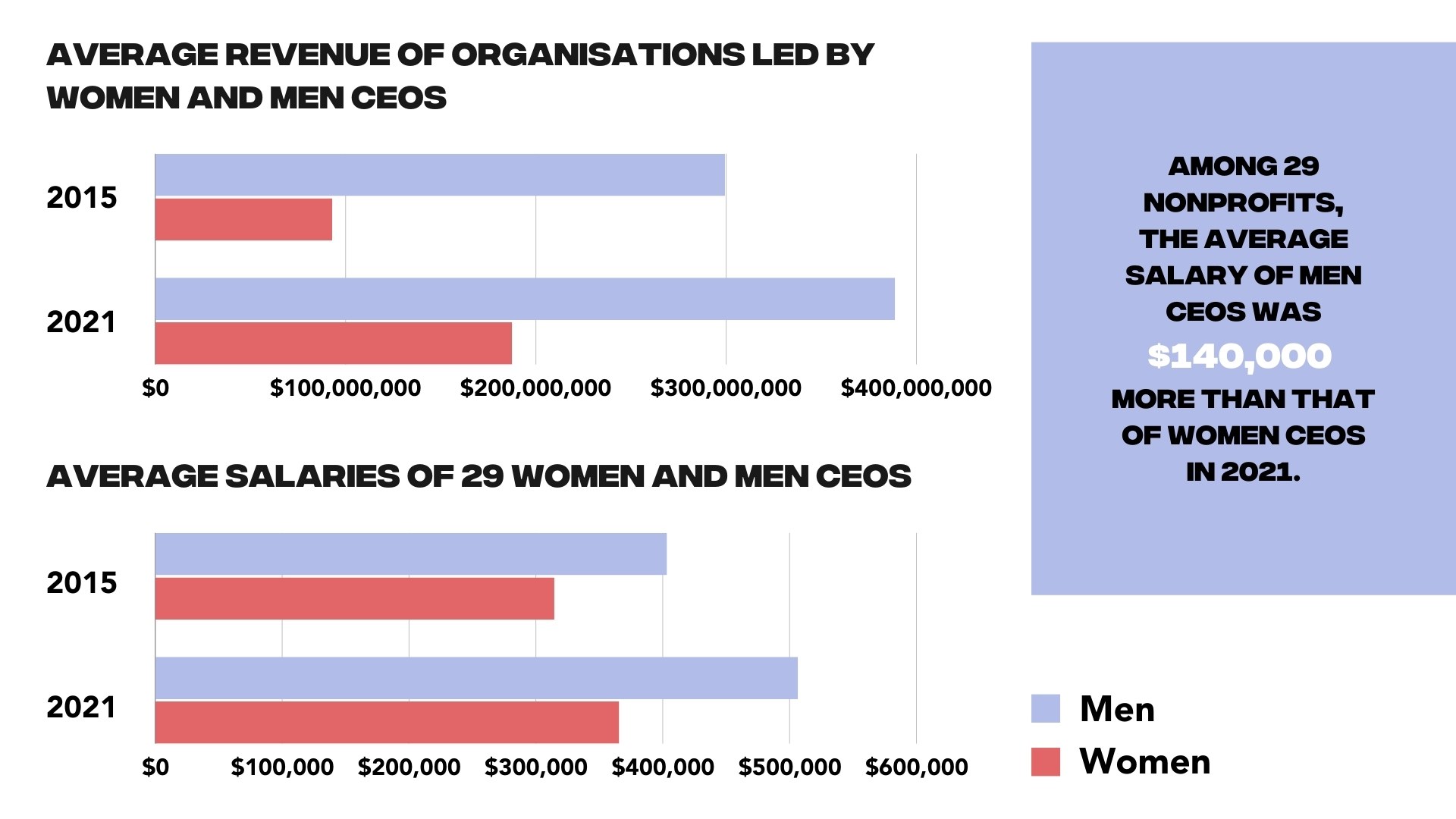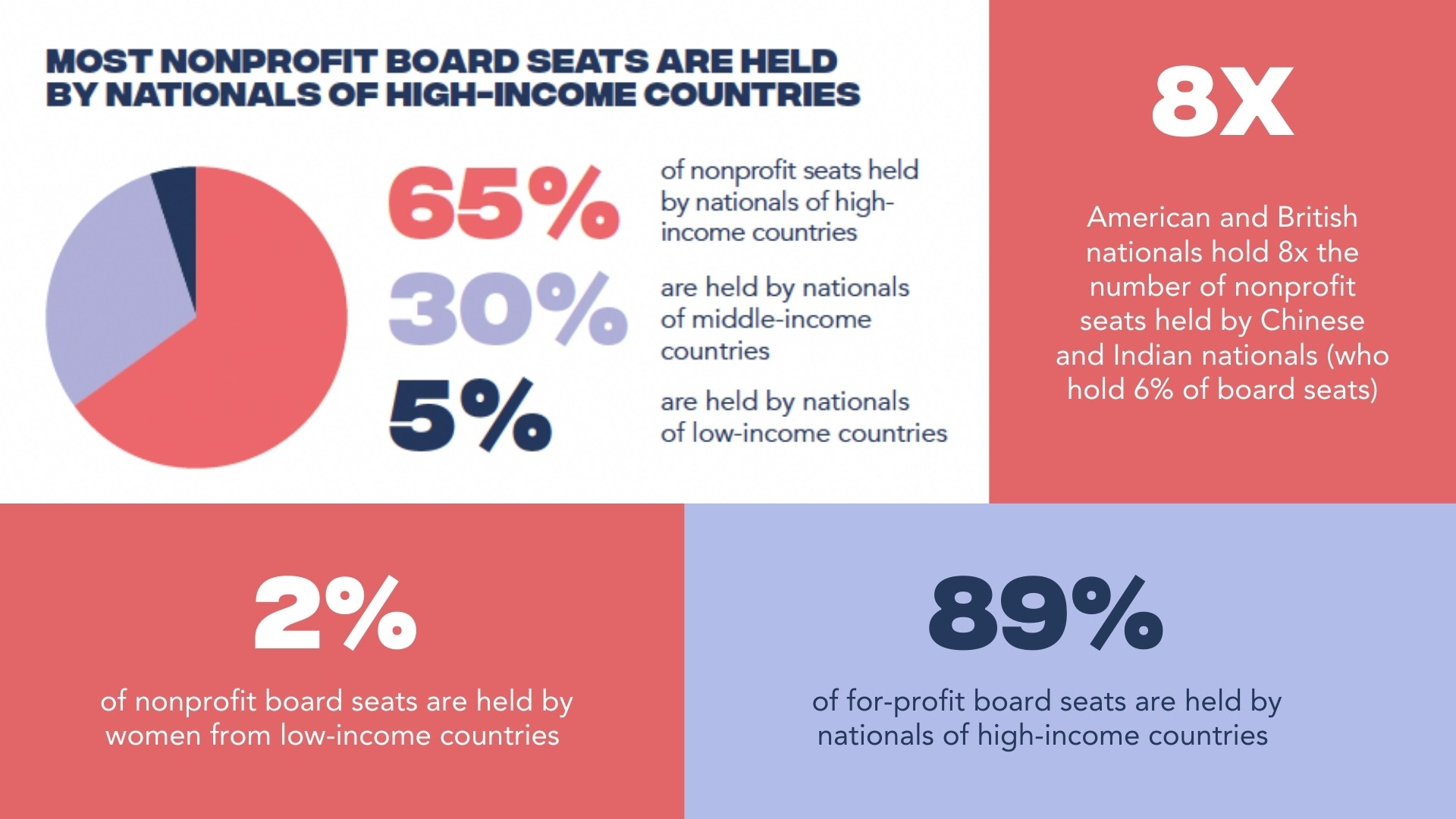Overview
The 2024 GH5050 Report presents evidence on the gender composition of boards governing global organisations active in health and the disproportionate influence of a few nationalities in these decision-making spaces. The data feeds into the growing dialogue on power dynamics in global health: Who sets priorities and solutions? What interests, worldviews, and principles underpin these decisions? Who ultimately benefits from the activities of organisations across the sector, and who is left behind?
Part 1 presents findings on the gender and nationality of 1,980 board members across 147 organisations. The Report finds that many boards are slightly more diverse than in 2022, when GH5050 conducted this analysis for the first time.
Alongside demographics of leadership, Part 1 explores power and privilege through the revenue size and salaries of women and men CEOs of the US-based NGOs in the sample. The Report also presents data on the gender pay gap reported by organisations in the sample with a presence in the UK, where employers with more than 250 staff are legally required to report their gender pay gap annually.
“Diverse boards are better equipped to understand and respond to the needs of their stakeholders and the populations they aspire to serve, leading to improved corporate governance and reputation.”
| Dr Ayoade Alakija, Chair of the FIND Board |
Part 2 presents findings on the progress of organisations over seven years, including on public commitments to gender equality, workplace gender equality, diversity and inclusion policies, representation in leadership, and reporting data disaggregated by sex. Part 3 offers ideas and opportunities on how to use the Report to drive change.
A final section presents organisational performance in 2024 - from very high to very low. Change in performance is also reported for each organisation (as consistently high performers; fast risers; and stagnators).
2024 : very high performer ( 2023 = very high performer)
2024 : high performer, (2023 = high performer)
2024 : moderate performer, (2023 = good performer)
2024 : low performer (2023 = moderate performer)
2024 : very low performer (2023 = low performer)
Want to know more about how a specific organisation performed?
Key findings
The key findings of Gaining ground? make clear that systemic reform to bring about diverse and inclusive global health governance bodies is urgently needed. Only through achieving global representation at the highest levels of leadership will we realise a global health system that is fit-for-purpose and able to achieve health for all.
Gender parity across nonprofit boards in the sample reached for the first time
Despite these ongoing inequalities, the report also highlights some encouraging shifts. The newest cohort of board chairs is more diverse than GH5050 first reported in 2020. For the first time, gender parity among board chairs in nonprofit organisations has been achieved, 51% of board chairs are women, a substantial increase from 30% in 2018. This progress mirrors the rise in public commitments to gender equality, which have grown from 68% in 2018 to 91% in 2024 among nonprofits in our sample.

Gender inequalities in pay and power remain visible
A closer look at power and pay reveals inequities even when gender parity has been achieved. An assessment of 29 US-based NGOs in the GH5050 sample shows that while half of CEOs are women, men lead organisations with average revenues twice as high as those led by women. Possibly because larger revenues are linked to larger salaries for CEOs, men who are CEOs earn on average $140,000 more annually than women leading NGOs.

Power imbalances remain widespread
Most organisations in the sample are headquartered in high-income countries. This geographical locus of power heavily influences the composition of their boards.
In nonprofit organisations, most board seats are occupied by nationals from high-income countries, with only 5% held by nationals from low-income countries. Women from low-income countries hold 2% of nonprofit board seats, while 34% of seats are held by men from the high-income countries. The proportion of women and nationals from low- and middle-income countries is even lower on the boards of for-profit companies in the sample.

Gender parity across nonprofit boards in the sample reached for the first time
Despite these ongoing inequalities, the report also highlights some encouraging shifts. The newest cohort of board chairs is more diverse than GH5050 first reported in 2020. For the first time, gender parity among board chairs in nonprofit organisations has been achieved, 51% of board chairs are women, a substantial increase from 30% in 2018. This progress mirrors the rise in public commitments to gender equality, which have grown from 68% in 2018 to 91% in 2024 among nonprofits in our sample.

Gender inequalities in pay and power remain visible
A closer look at power and pay reveals inequities even when gender parity has been achieved. An assessment of 29 US-based NGOs in the GH5050 sample shows that while half of CEOs are women, men lead organisations with average revenues twice as high as those led by women. Possibly because larger revenues are linked to larger salaries for CEOs, men who are CEOs earn on average $140,000 more annually than women leading NGOs.

Power imbalances remain widespread
Most organisations in the sample are headquartered in high-income countries. This geographical locus of power heavily influences the composition of their boards.
In nonprofit organisations, most board seats are occupied by nationals from high-income countries, with only 5% held by nationals from low-income countries. Women from low-income countries hold 2% of nonprofit board seats, while 34% of seats are held by men from the high-income countries. The proportion of women and nationals from low- and middle-income countries is even lower on the boards of for-profit companies in the sample.

Gender parity across nonprofit boards in the sample reached for the first time
Despite these ongoing inequalities, the report also highlights some encouraging shifts. The newest cohort of board chairs is more diverse than GH5050 first reported in 2020. For the first time, gender parity among board chairs in nonprofit organisations has been achieved, 51% of board chairs are women, a substantial increase from 30% in 2018. This progress mirrors the rise in public commitments to gender equality, which have grown from 68% in 2018 to 91% in 2024 among nonprofits in our sample.

“In yet another valuable report, GH5050 finds that women CEOs of nonprofits not only earn considerably less than their male counterparts but also control billions of dollars less in revenue. The fact that half of the CEOs in the sample were women should remind us that gender parity does not by itself equate to power parity.”
| Nabeeha Kazi Hutchins, President and CEO, PAI |
Empowering change: Accelerating progress towards gender equality
With the launch of this Report, we urge you to act. We encourage staff, staff associations, unions and other stakeholders, including donors, to use the findings of this Report to put pressure on leadership in organisations, particularly those that are performing poorly in the GH5050 Index. We call on funders to invest more in accountability mechanisms, including to hold organisations accountable for shaping inclusive and equitable workplaces.
Unsure where to start?
If you are a leader or staff member of one of the 201 organisations in the 2024 Report...
- Get an in-depth look at your organisation’s results in these Scorecards
- Compare your organisation’s results to others in the Gender & Health Index
If you are interested in setting or improving workplace policies on gender equality, diversity and inclusion...
- Our How-To Guides offer practical tools on setting policies
- This Policy Repository collates workplace policies and strategies reviewed by GH5050
- Learn how others have made change in our Impact Stories of Change
If you are a funder and interested in how grantees perform...
- See the 2024 Organisational Ranking, from high to low performers
- Get an in-depth look at organisations’ results in these Scorecards
- Compare organisations’ results in the Gender & Health Index
If you are with an organisation that is not in the 2024 Report...
- Assess how your organisation performs in our Self-assessment Tool
- Learn how others have made change in our Impact Stories of Change.
If you are a researcher...
- Read about our Report Methodology here
- Download all Gender & Health Index data for further exploration
If you would like to join us in sharing the findings of the Report...
- Share these infographics via your channels
- Explore the rich and diverse This is Gender image collection
- Read the 2024 Report press release
- A Guide to sharing the report
“Advancing diversity and inclusion requires the same rigour and attention that we apply to our scientific activities. I urge leaders and staff to keep pushing - ensuring that these policies are championed by leadership, that they are made robust through metrics and tracking, regular review, holding supervisors accountable for fair, equitable, and inclusive behaviours.”
| Hannah Valantine, Professor of Medicine, Stanford University, USA. Inaugural and former Chief Officer for Scientific Workforce Diversity at the United States National Institutes of Health |

